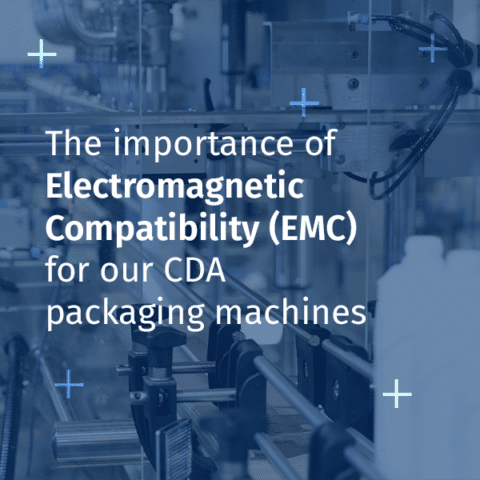What is EMC?
Electromagnetic Compatibility (EMC) is a technical field that examines how electrical and electronic devices coexist without causing mutual interference. Specifically, it focuses on the equipment’s capacity to function correctly in its electromagnetic environment without disturbing other devices. EMC is crucial for ensuring the safety and performance of the equipment, particularly in industries where numerous machines operate simultaneously. EMC testing ensures that the machines do not cause interferences that could compromise the accuracy of packaging operations (such as our filling, capping, and labelling machines) and users’ safety.
Electromagnetic Compatibility (EMC) and CDA’s Packaging Machines
EMC must be considered during the design, production, and use of electrical and electronic devices. It ensures that these devices can operate without interfering with nearby electrical equipment and without being disturbed by emissions from other devices. CDA’s packaging machines (including filling, capping, labelling, and monoblock systems) contain electrical and electromagnetic components. Therefore, EMC must be considered during design (by our R&D department) and during the production of our machines (by our assembly teams at our Narbonne workshop). A set of the best practices is followed to ensure reliable and safe operations.
Importance of EMC for CDA Packaging Machines
CDA’s packaging machines, particularly the filling machines, cappers, labellers, and monoblocks, must comply with EMC standards to ensure they do not disrupt various equipment. For instance, an automatic filling machine like the K-Line S, an automatic capper like the VS 2000, or a labeller like the Ninon Mix, must adhere to EMC standards to operate effectively in a production environment without causing significant interference. All of them.
Practical Applications for CDA Machines
At CDA, EMC testing is applied to all our machines. For example, when designing the E-Fill SW monoblock, it is essential to ensure that it does not emit EMC levels that could disrupt other machines while being protected from their potential emissions.
Advantages of EMC for Packaging Machines
Ensuring EMC compliance for our packaging machines offers several benefits:
- Increased Safety: Equipment compliant with EMC standards minimise harmful electromagnetic interference risks, ensuring a safer production environment.
- Market Access: Compliance with international standards facilitates access to various global markets.
- Product Reliability: Enhances product reliability and market reputation by demonstrating a commitment to quality and safety.
Conclusion
Electromagnetic compatibility is a crucial aspect for machine manufacturers. By ensuring that equipment such as filling machines, cappers, and labellers meet EMC standards, manufacturers can, not only ensure the safety and reliability of their products, but also access new international markets. Thus, CDA remains committed to providing high-quality packaging machines that meet EMC standards, while ensuring optimal performance and high reliability for their customers across various industries.











